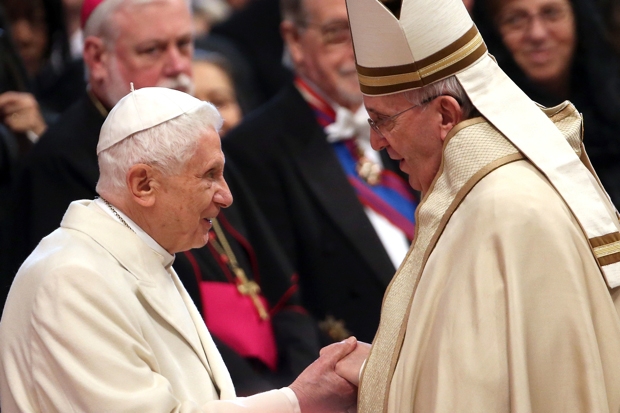One of the finest speeches Benedict XVI ever delivered was about sacred music. It is a small masterpiece, in which Benedict recalls his first encounter with Mozart in the liturgy. ‘When the first notes of the Coronation Mass sounded, Heaven virtually opened and the presence of the Lord was experienced very profoundly,’ he said.
Benedict robustly defended the performance of the work of great composers at Mass, which he insisted was necessary for the fulfilment of the Second Vatican Council’s wish that ‘the patrimony of sacred music [is] preserved and developed with great care’.
Then he asked: what is music? He identified three places from which it flowed. First, the experience of love, opening ‘a new grandeur and breadth of reality’ that inspires music. Second, ‘the experience of sadness, death, sorrow and the abysses of existence’. These open ‘in an opposite direction, new dimensions of reality that can no longer find answers in discourses alone’. Third, the encounter with the divine. ‘I find it moving to observe how, in the Psalms, singing is no longer enough for men — an appeal is made to all the instruments: reawakened is the hidden music of creation, its mysterious language.’
You can find footage of part of this speech online. It shows Benedict in his prime, speaking with light fluency, dressed in papal robes and appearing thoroughly relaxed in the papal summer residence of Castel Gandolfo.
Ah, the good old days, traditionalists may sigh. But perhaps you’ve noticed that I haven’t referred to ‘Pope Benedict’. That is because he gave the speech last Saturday.
When Benedict suddenly vacated the chair of Peter in February 2013, he announced that he would live out his days in silence in the Vatican monastery of Mater Ecclesiae. If that was a promise, he has never quite kept to it.
Last year, the Pope Emeritus slapped down his old adversary Cardinal Walter Kasper, a left-wing German theologian, for suggesting that, when he was still Professor Ratzinger, he supported communion for divorced and remarried Catholics — Kasper’s pet cause. He has warned the Church against ‘any wavering from the Truth’. He has welcomed news that the Ordinariate — the body he set up for ex-Anglicans, disgracefully sidelined by the English bishops — now worships in the former Bavarian embassy chapel in Soho. And he told traditionalists that the pre-Vatican II Latin Mass ‘now lives in full peace in the Church, even among the young, with celebration by great cardinals’.
Most of these interventions can be interpreted as implicit criticism of Pope Francis. The ‘wavering from the Truth’ comment was directed at Kasper, a mentor to Francis whose radical ideas provoked fury at last October’s Synod on the Family. (Significantly, the Vatican tried to keep Benedict’s words from reaching the press.) The Ordinariate letter is unlikely to have bothered the Pope, but the message to Latin Mass supporters will have annoyed him. When Benedict praised ‘great cardinals’, he had in mind the arch-conservative Raymond Burke — whom Francis sacked as head of the Vatican’s legal tribunal.
Benedict’s reflections on music are, on the face of it, uncontroversial. But they are the first he has delivered in public — looking rejuvenated. Moreover, in citing Vatican II to defend liturgical high art, he was reviving the ‘hermeneutic of continuity’, the great theme of his pontificate. Benedict views Vatican II as an enrichment of tradition. Francis sees it as a ‘new beginning’ and accuses its critics of ‘wanting to tame the Holy Spirit’. He has rejected the hermeneutic of continuity.
Liberal Catholics will dismiss Benedict’s comments as the embittered musings of a disappointed 88-year-old and point instead to the million-strong crowd Francis drew in Ecuador this week. They overlook something obvious to visitors to many British parishes: younger clergy and worshippers in the West tend to be natural Benedictines, not Franciscans. My own parish is not ‘traditionalist’ but its liturgy has become more solemn, the music more classical and a crucifix has appeared on the altar: a trademark of the hermeneutic of continuity because the priest symbolically faces east, as once he did literally.
Joseph Ratzinger is not the Pope. But by calling himself ‘Benedict XVI’, dressing in white and keeping the word ‘pope’ in his title, he reminds us that he is a living successor to St Peter. Quite what authority that bestows on him is a mystery. But clearly he feels entitled to reach out discreetly to members of the faithful distressed by the dismantling of his legacy. To these Catholics, Benedict is saying, in language far more eloquent than the crowd-pleasing paragraphs of Francis’s encyclical on the environment: my vision is not dead. And nor am I.







Comments